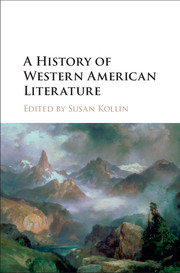Book contents
- Frontmatter
- Contents
- Notes on Contributors
- Acknowledgments
- Introduction: Historicizing the American Literary West
- PART I HOMELANDS
- PART II MAKING A REGION
- 3 Domestic Frontiers: Settler Narratives by European American Women Writers
- 4 Labor and the Land: Narratives of Trading, Mining, and Ranching
- 5 Nature Writing and the American West
- 6 Tall Tales and Short Stories
- 7 The Popular Western
- PART III GEOGRAPHIES OF THE LITERARY WEST
- PART IV THE TWENTIETH CENTURY AND BEYOND: LITERARY MOVEMENTS AND CRITICAL PERSPECTIVES
- Selected Bibliography
- Index
5 - Nature Writing and the American West
from PART II - MAKING A REGION
Published online by Cambridge University Press: 05 November 2015
- Frontmatter
- Contents
- Notes on Contributors
- Acknowledgments
- Introduction: Historicizing the American Literary West
- PART I HOMELANDS
- PART II MAKING A REGION
- 3 Domestic Frontiers: Settler Narratives by European American Women Writers
- 4 Labor and the Land: Narratives of Trading, Mining, and Ranching
- 5 Nature Writing and the American West
- 6 Tall Tales and Short Stories
- 7 The Popular Western
- PART III GEOGRAPHIES OF THE LITERARY WEST
- PART IV THE TWENTIETH CENTURY AND BEYOND: LITERARY MOVEMENTS AND CRITICAL PERSPECTIVES
- Selected Bibliography
- Index
Summary
Nature writing about the American West is a kind of discourse that not only describes but also constructs the landscape of the West. Rather than seeing the American West as a static, given space, any investigation of the region must begin with the notion that the West is continually reconstituted as a space of the frontier, of vast wilderness, of freedom, of rugged individualism, of the destiny of American expansion, through discourses about it. In particular, the genre of the nature essay has played a major role in constituting the West, both as a material place and as a set of symbols in the American mind, to use Roderick Nash's term. The nature essay as exemplified by Ralph Waldo Emerson's “Nature” and “Self-Reliance” is a tradition that weaves together forms of travel narrative, philosophy, landscape description, environmental reporting, reflections on field notes, outdoor writing, natural and local history, autobiography and diary, prose fiction, and other genres. Its modes are primarily the sublime and pastoral, which it deploys to define the West as a retreat from tradition and urbanization and a place where American national nature is born, and thus a landscape of transcendence. The nature essay promises this of the western landscape, which, as Krista Comer writes, “comes into representation by and large as symbol of a fixed and specific place.”
Further, western landscapes studies “masquerade as ‘the natural,’” as Comer argues. This is in large part because of the tradition of the nature essay about and from the American West. As the landscape par excellence of the wild – epitomized by Thoreau when he wrote that “the West of which I speak is another name for the Wild” – the West both inspired and was constructed by the genre of the nature essay that was gaining popularity just as the West was “being won.” The emergence of the nature essay as a protoenvironmentalist discourse helped justify the creation of national parks and other forms of public lands in the American West during the nineteenth and into the twentieth century.
- Type
- Chapter
- Information
- A History of Western American Literature , pp. 82 - 97Publisher: Cambridge University PressPrint publication year: 2015



